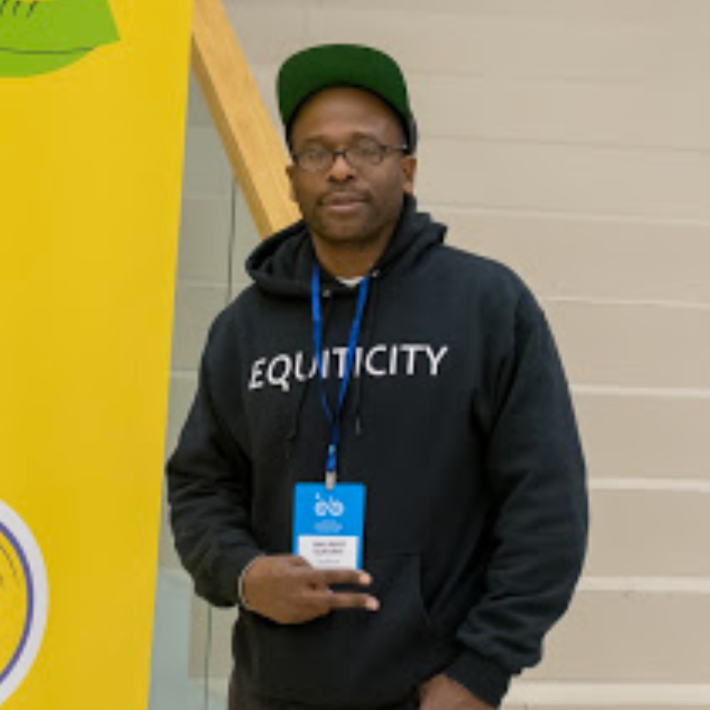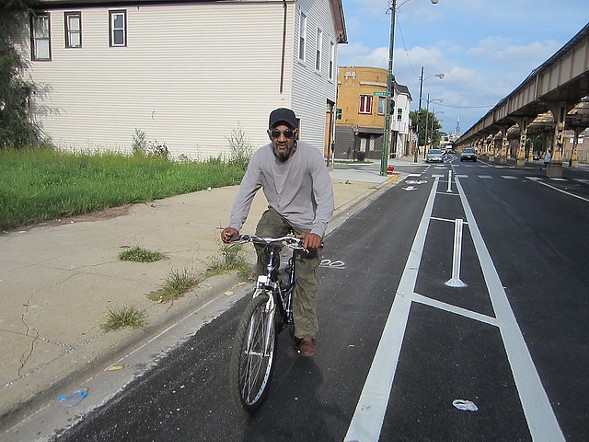Last week the Chicago Tribune’s Mary Wisniewski reported that, almost a year after she first uncovered massive discrepancies in the number of bike tickets written in Black communities versus majority-white ones, new number show that little has changed. For example, in 2017 police wrote 397 bike citations in North Lawndale while – for the second year in a row – only five tickets were issued in Lincoln Park. Community members and bike advocates say the focus on ticketing cyclists in African-American neighborhoods appears to be an excuse for stop-and-frisk policing that would otherwise be illegal.
In the wake of Monday’s article Oboi Reed, former leader of the bike equity group Slow Roll Chicago and head of the Equiticity mobility justice organization, told me he was “shocked” by the new numbers. He found the news especially troubling because last year he and other Black advocates met last year with representatives of the mayor’s office and the Chicago Department of Transportation, who promised to address the Chicago Police Department’s racially biased ticketing practices.
“There will be a full-throated response [from advocates] to the city’s continued racism, inequity, bias, and paternalism, which continues to harm, and in some cases kill, Black, Brown, and Indigenous people of color in our city,” Reed promised. “These tickets are financially harmful, and socially harmful, and any police interaction in our neighborhoods comes with a risk [of police violence.]"
In addition to pushing for an end to inequitable ticketing, Last year Reed called on the city to eliminate the possibility of using increased traffic policing in communities of color as a crash prevention strategy for Chicago’s Vision Zero program. He argued that in light of the CPD’s well-documented problems with civil rights abuses, more on-street interaction between residents and officers could be counterproductive to public safety.

On Thursday Reed made good on his promise of a robust response to the city’s lack of progress on unfair ticketing with a long thread on Twitter detailing advocates’ efforts to confront the issue. He started out by mentioning that soon after he cofounded Slow Roll in September 2014, South and West side residents told him that police seemed to be targeting Black and Latino cyclists for tickets, which discouraged them from riding. He said that when he discussed the issue with white bike advocates, many of them were skeptical that there was a racial profiling issue until Wisniewski’s first report came out in March 2017.
Reed argued that when Chicago’s Vision Zero plan was released in July 2017, the plan had insufficient input from residents of South and West Side neighborhoods with high traffic violence rates, which the plan identified as focus areas for its anti-crash initiatives. He described the plan as “inequitable, paternalistic, biased and dismissive of concerns Black and Brown folks have for the risks associated with us engaging with CPD.”
In his Twitter thread, Reed noted that he, Ronnie Matthew Harris from the transportation advocacy group Go Bronzeville, public policy consultant Amara Enyia, and Kofi Ademola from Black Lives Matter Chicago met with city officials in September to discuss bike ticketing and other Vision Zero issues. Representatives for the city included deputy mayor Andrea Zopp, deputy policy director Cara Bader, deputy chief of staff for public engagement Roderick Hawkins, and CDOT commissioner Rebekah Scheinfeld. The advocates presented the officials with a list of nine “Vision Zero Asks” to make the safety program more equitable, including the elimination of additional traffic policing as a strategy.
“The city flat out said no to removing [additional] police enforcement from” the Vision Zero plan, Reed wrote. He added that city officials also turned down the advocates' request to transfer the management of the program, along with necessary resources, to one South Side community organization and one West Side group. Reed said the officials were willing to look into ideas for creating more ownership and investment in Vision Zero in African-American and Latino communities, and they were open to finding common ground on the other seven VZ asks.
When the advocates brought up the CPD’s inequitable ticketing practices at the meeting, the city officials told them that they had been surprised by Wisniewski’s first report and had no idea that officers were targeting cyclists in communities of color, Reed said. “They assured us that this had been resolved and the practice was ended,” he wrote.
But when the second Tribune piece came out last week showing that little had changed, “CPD was caught red-handed continuing to racially profile Black and Brown cyclists on the South Side and West Side,” Reed tweeted. He slammed the city’s failure to take action to address the problem:
And, now we have evidence of continued inequities at CPD. Yet, the Mayor insists on including a police enforcement strategy in VZ Chi. We call this structural, systemic, institutional racism. We call this paternalism, bias and inequity. We call it disrespect and dismissiveness.
— Olatunji Oboi Reed (@theycallmeOboi) February 15, 2018
At the Mayor’s Pedestrian Advisory Council meeting last Wednesday, the day before Reed’s tweet storm, there was at least some acknowledgement from city officials that many residents in the Vision Zero focus communities don’t want additional traffic policing used as a crash-prevention strategy. “Through the survey process and in our public meetings we’ve learned that West Siders mostly want to see education events and changes to street design,” said deputy CDOT commissioner Luann Hamilton. “So I’m sure we’ve probably heard that there was some concern about the role of enforcement in Vision Zero and that was reflected in the preference that was expressed for education and street design.”
CDOT did traffic safety outreach and input gathering with residents at 225 West Side events last summer and fall, with 7,750 people contacted, Hamilton reported. The final round of the outreach project will include roundtable meetings with community organization leaders and an Open Streets-style event to increase awareness. She added that CDOT has applied for grant funding already this year for community-driven plans for the Northwest Side and the South Side High Crash Areas.
However, Reed made it clear that he’s not satisfied with the city merely acknowledging that many residents of color don’t want additional traffic policing in their neighborhoods. “Our Equiticity racial equity movement will not rest until police enforcement is removed from Vision Zero,” he wrote.





